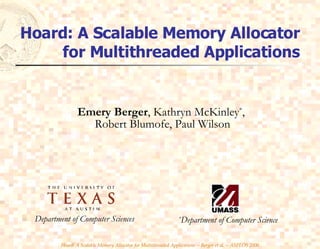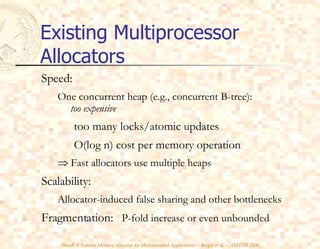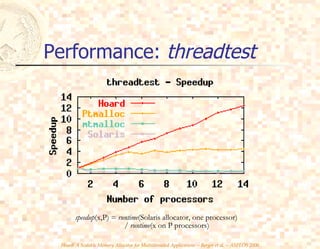Hoard: A Scalable Memory Allocator for Multithreaded Applications
- 1. Hoard: A Scalable Memory Allocator for Multithreaded Applications Emery Berger , Kathryn McKinley * , Robert Blumofe, Paul Wilson Department of Computer Sciences * Department of Computer Science
- 2. Motivation Parallel multithreaded programs becoming prevalent web servers, search engines, database managers, etc. run on SMP’s for high performance often embarrassingly parallel Memory allocation is a bottleneck prevents scaling with number of processors
- 3. Assessment Criteria for Multiprocessor Allocators Speed competitive with uniprocessor allocators on one processor Scalability performance linear with the number of processors Fragmentation (= max allocated / max in use) competitive with uniprocessor allocators worst-case and average-case
- 4. Uniprocessor Allocators on Multiprocessors Fragmentation: Excellent Very low for most programs [Wilson & Johnstone] Speed & Scalability: Poor Heap contention a single lock protects the heap Can exacerbate false sharing different processors can share cache lines
- 5. Allocator-Induced False Sharing Allocators cause false sharing! Cache lines can end up spread across a number of processors Practically all allocators do this processor 1 processor 2 x2 = malloc(s); x1 = malloc(s); A cache line thrash… thrash…
- 6. Existing Multiprocessor Allocators Speed: One concurrent heap (e.g., concurrent B-tree): too expensive too many locks/atomic updates O(log n) cost per memory operation Fast allocators use multiple heaps Scalability: Allocator-induced false sharing and other bottlenecks Fragmentation: P-fold increase or even unbounded
- 7. Multiprocessor Allocator I: Pure Private Heaps Pure private heaps : one heap per processor. malloc gets memory from the processor's heap or the system free puts memory on the processor's heap Avoids heap contention Examples: STL, ad hoc (e.g., Cilk 4.1) x1= malloc(s) free(x1) free(x2) x3= malloc(s) x2= malloc(s) x4= malloc(s) processor 1 processor 2 = allocated by heap 1 = free, on heap 2
- 8. How to Break Pure Private Heaps: Fragmentation Pure private heaps : memory consumption can grow without bound! Producer-consumer: processor 1 allocates processor 2 frees free(x1) x2= malloc(s) free(x2) x1= malloc(s) processor 1 processor 2 x3= malloc(s) free(x3)
- 9. Multiprocessor Allocator II: Private Heaps with Ownership Private heaps with ownership: free puts memory back on the originating processor 's heap. Avoids unbounded memory consumption Examples: ptmalloc [Gloger], LKmalloc [Larson & Krishnan] x1= malloc(s) free(x1) free(x2) x2= malloc(s) processor 1 processor 2
- 10. How to Break Private Heaps with Ownership:Fragmentation Private heaps with ownership: memory consumption can blowup by a factor of P. Round-robin producer-consumer: processor i allocates processor i+1 frees This really happens (NDS). free(x2) free(x1) free(x3) x1= malloc(s) x2= malloc(s) x3=malloc(s) processor 1 processor 2 processor 3
- 11. So What Do We Do Now?
- 12. The Hoard Multiprocessor Memory Allocator Manages memory in page-sized superblocks of same-sized objects - Avoids false sharing by not carving up cache lines - Avoids heap contention - local heaps allocate & free small blocks from their set of superblocks Adds a global heap that is a repository of superblocks When the fraction of free memory exceeds the empty fraction , moves superblocks to the global heap - Avoids blowup in memory consumption
- 13. Hoard Example Hoard : one heap per processor + a global heap malloc gets memory from a superblock on its heap. free returns memory to its superblock . If the heap is “too empty”, it moves a superblock to the global heap. x1= malloc(s) processor 1 global heap free(x7) … some mallocs … some frees Empty fraction = 1/3
- 14. Summary of Analytical Results Worst-case memory consumption: O(n log M/m + P ) [instead of O( P n log M/m)] n = memory required M = biggest object size m = smallest object size P = number of processors Best possible: O(n log M/m) [Robson] Provably low synchronization in most cases
- 15. Experiments Run on a dedicated 14-processor Sun Enterprise 300 MHz UltraSparc, 1 GB of RAM Solaris 2.7 All programs compiled with g++ version 2.95.1 Allocators: Hoard version 2.0.2 Solaris (system allocator) Ptmalloc (GNU libc – private heaps with ownership) mtmalloc (Sun’s “MT-hot” allocator)
- 16. Performance: threadtest speedup (x,P) = runtime (Solaris allocator, one processor) / runtime (x on P processors)
- 17. Performance: Larson Server-style benchmark with sharing
- 18. Performance: false sharing Each thread reads & writes heap data
- 19. Fragmentation Results On most standard uniprocessor benchmarks, Hoard’s fragmentation was low: p2c (Pascal-to-C): 1.20 espresso: 1.47 LRUsim : 1.05 Ghostscript : 1.15 Within 20% of Lea’s allocator On the multiprocessor benchmarks and other codes: Fragmentation was between 1.02 and 1.24 for all but one anomalous benchmark (shbench : 3.17) .
- 20. Hoard Conclusions Speed: Excellent As fast as a uniprocessor allocator on one processor amortized O(1) cost 1 lock for malloc , 2 for free Scalability: Excellent Scales linearly with the number of processors Avoids false sharing Fragmentation: Very good Worst-case is provably close to ideal Actual observed fragmentation is low
- 21. Hoard Heap Details “ Segregated size class” allocator Size classes are logarithmically-spaced Superblocks hold objects of one size class empty superblocks are “recycled” Approximately radix-sorted: Allocate from mostly-full superblocks Fast removal of mostly-empty superblocks 8 16 24 32 40 48 sizeclass bins radix-sorted superblock lists (emptiest to fullest) superblocks




![Uniprocessor Allocators on Multiprocessors Fragmentation: Excellent Very low for most programs [Wilson & Johnstone] Speed & Scalability: Poor Heap contention a single lock protects the heap Can exacerbate false sharing different processors can share cache lines](https://image.slidesharecdn.com/hoard-a-scalable-memory-allocator-for-multithreaded-applications-13641/85/Hoard-A-Scalable-Memory-Allocator-for-Multithreaded-Applications-4-320.jpg)




![Multiprocessor Allocator II: Private Heaps with Ownership Private heaps with ownership: free puts memory back on the originating processor 's heap. Avoids unbounded memory consumption Examples: ptmalloc [Gloger], LKmalloc [Larson & Krishnan] x1= malloc(s) free(x1) free(x2) x2= malloc(s) processor 1 processor 2](https://image.slidesharecdn.com/hoard-a-scalable-memory-allocator-for-multithreaded-applications-13641/85/Hoard-A-Scalable-Memory-Allocator-for-Multithreaded-Applications-9-320.jpg)




![Summary of Analytical Results Worst-case memory consumption: O(n log M/m + P ) [instead of O( P n log M/m)] n = memory required M = biggest object size m = smallest object size P = number of processors Best possible: O(n log M/m) [Robson] Provably low synchronization in most cases](https://image.slidesharecdn.com/hoard-a-scalable-memory-allocator-for-multithreaded-applications-13641/85/Hoard-A-Scalable-Memory-Allocator-for-Multithreaded-Applications-14-320.jpg)






